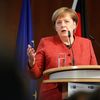Fraud Scandal at Germany’s Bankrupt Wirecard Lead to More Arrests

BERLIN, KOMPAS.com — More arrests have been made at the bankrupt German payment company Wirecard in a fraud scandal that took down the company’s former CEO.
Wirecard’s former CEO, Markus Braun, has been taken back into custody after the case against him was expanded, according to prosecutors.
Two former executives at Wirecard have also been arrested on Wednesday.
The two managers are suspected of defrauding investors of around $3.7 billion by inflating the company’s balance sheet.
The former execs are Wirecard’s former Chief Financial Officer until end-2017 and former Head of Accounting.
The updates revealed on Wednesday were shared by Munich prosecutor Anne Leiding.
Anne identified the two individuals as L. and von E. respectively, in keeping with German privacy rules.
The case against ex-CEO Markus Braun was expanded and a judge ordered him kept in custody, Leiding said.
Markus Braun was first arrested last month on suspicion of market manipulation and falsifying financial results, and then released on bail.
A fourth former executive, the head of a subsidiary in Dubai, was arrested in early July.
Wirecard filed for protection from creditors through an insolvency proceeding on June 25 after executives admitted that €1.9 billion ($2.2 billion) that had been represented as being held in trust accounts in the Philippines probably did not exist.
The company said it is investigating the scope of its business handling payments through regional third parties, a major source of profits, and how that business was being conducted.
Leiding said prosecutors believe that the four suspects arrested, along with others, agreed in 2015 to inflate Wirecard's balance sheet by faking income from business with so-called third-party acquirers, making it more attractive to potential investors.
“In reality, it was clear to the suspects by the end of 2015 at the latest that Wirecard was losing money overall with its actual business,” she told reporters.
The suspects initiated talks that resulted in banks in Germany and Japan - along with other investors hoodwinked by the over-rosy annual accounts - providing some €3.2 billion in total, Leiding said.


































